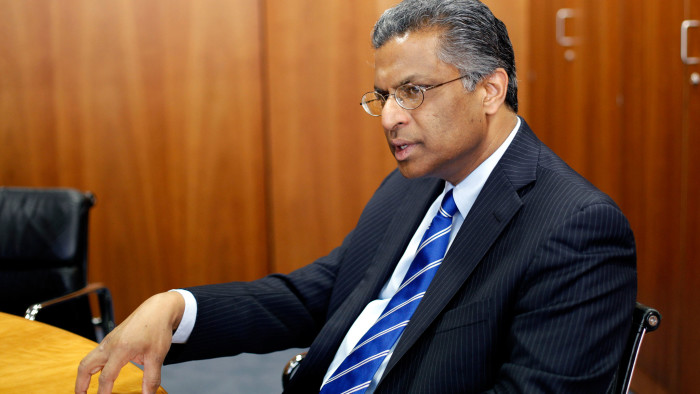Meet the dean: Anand Anandalingam, Imperial College

Roula Khalaf, Editor of the FT, selects her favourite stories in this weekly newsletter.
For Anand Anandalingam, being the dean of a business school in the UK bears remarkable similarities to being a dean on the other side of the pond. “I could just as well be in the US,” says the new boss at the business school at London’s Imperial College. “It is all very similar.”
On a day-to-day basis, says the former dean of the Smith school at the University of Maryland, the job involves spending time to talk to faculty to explore what research they are working on and what they need help with to make the business school better. “The value systems are very much the same as in the US; education is cherished. I think everyone wants business schools to do better things for society.”
However, there are some institutional differences, he acknowledges. “There seems to be a lot slower process to get things approved.” But this is unlikely to hold back Prof Anandalingam who clearly has big plans for the business school.
Central to all of these will be raising money, something that Imperial has proved itself quite adept at in recent months. In March the business school announced it had received more than £20m, at the time the largest single donation to a UK business school, from hedge fund Brevan Howard, to set up a research centre in financial economics.
Notwithstanding this, “Philanthropy hasn’t quite caught up in the UK,” believes UK-born Prof Anandalingam. “There are a lot of wealthy, well-meaning people here but there is a view that education is still in the hands of government.”
And, he adds, “It almost seems déclassé to ask for money. “
But his experience at one of the US’s top public business schools has given him insights that he clearly hopes to implement in London. He raised $45m in five years at Smith and that was during a recession.
One of the biggest issues is building loyalty, he says, which US universities achieve through treating students well when they are at the university and keeping in touch once they have left. “[In the UK] When the students are here we treat them well. We don’t do such a good job in keeping in touch.”
His first response to this is to build up the school’s executive education portfolio – the school has an income in executive education of just £2.5m a year, a fraction of some of the other top UK business schools, such as London Business School, Oxford, or Ashridge. “One of the things I am planning to do here is get the business school involved in life-long education. We’re going to try and bring them [alumni] back into executive education.”
This build-up will include open enrolment programmes in traditional business school subjects such as leadership, marking and finance, as well as customised programmes.
Although the business school was set up in 1987, it is only in the past 10 years that it has gained any prominence. As a result there are relatively few alumni and most of those are relatively young. What is more, they work all over the world, making communication more difficult than in a traditional US business school, where most alumni work in the US.
But the university, with its focus on science, engineering and medicine, is world-class, argues Prof Anandalingam. “Imperial College by any standard is ranked in the top 10 or 20 [universities] in the world.” As an engineering graduate from the University of Cambridge – it was there he met James Stirling, provost of Imperial College – and a specialist in technology management and telecommunications systems, the university is a natural fit for Prof Anandalingam.
Not surprisingly, then, these science subjects are areas with which he wants to work more closely, in particular healthcare and engineering – the business school already has real strength is innovation, design, entrepreneurship and finance, he says. “The theme of the business school is going to be innovation,” he says. “My dream is that we become the executive education provider for science and technology companies.”
But he also has plans to make the business school a more rounded institution. “I’m going to bring in more critical mass in marketing, strategy and operations. Then we can compete with the top business schools.” Though the build-up will be in traditional subject areas, it will address non-traditional issues, he says. Marketing, for example, needs to be about digital marketing and personalised marketing “at the interface of digital and marketing, coupled with big data,” he explains.
The masters programmes at Imperial are particularly strong, says the new dean, but he intends to build up the MBA, despite the worldwide softening in the MBA market. “It [demand] doesn’t soften at Harvard and Wharton,” he points out. He intends to expand the one-year programme from around 60 students to 100.
There is only one problem: having moved into the business school building about a decade ago, the school is already running out of space. If he is to achieve his plans, Prof Anandalingam will have to put the physical expansion of the school at the top of the agenda.
Comments